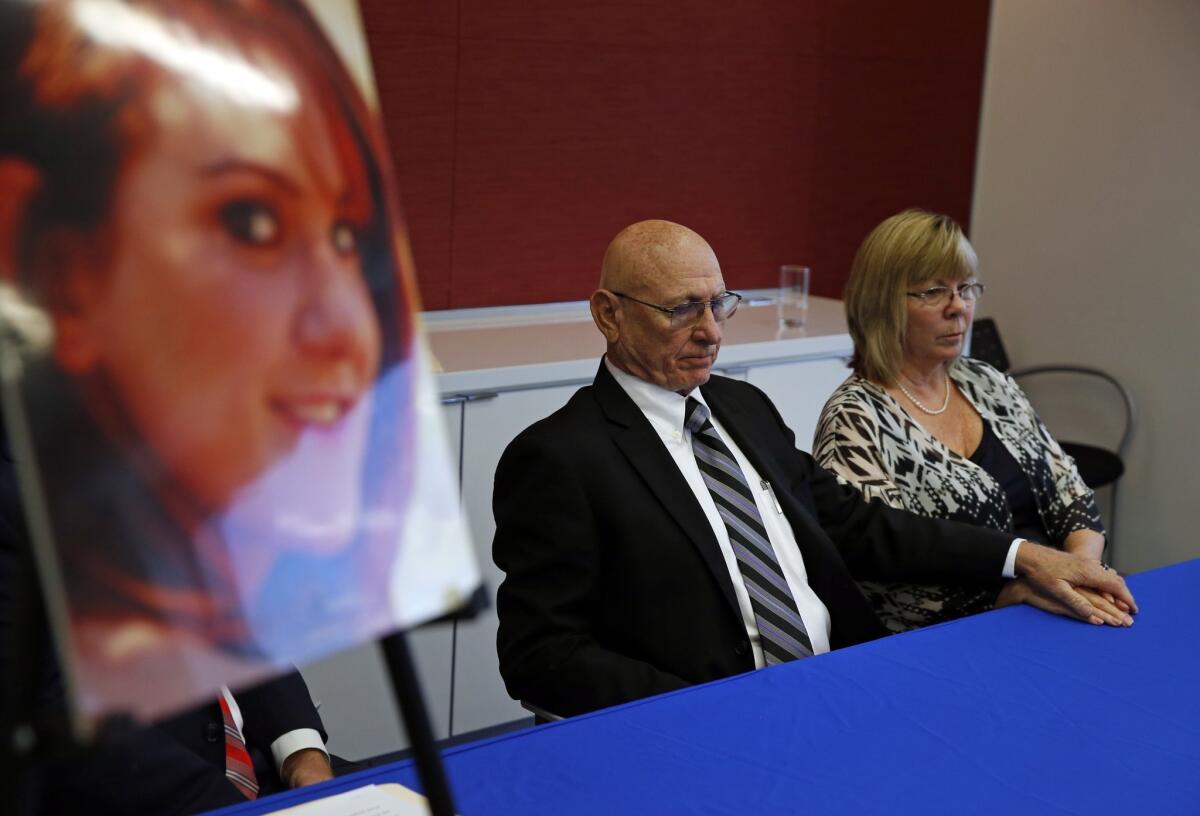Family of Aurora shooting victim sues ammo, body armor suppliers

- Share via
More than two years after James E. Holmes killed 12 people and wounded 70 at a movie theater in Aurora, Colo., the family of one of the victims has filed suit against the websites where they say he bought the ammunition, body armor and tear gas used to carry out the attack.
The companies “failed to implement any reasonable safeguards to prevent dangerous people from obtaining high-capacity ammunition magazines, thousands of rounds of ammunition, body armor, and tear gas,” said the lawsuit, filed on behalf of Sandy and Lonnie Phillips, whose daughter Jessica Ghawi died in the shooting.
The lawsuit was filed by the Brady Center to Prevent Gun Violence, and names as defendants Lucky Gunner, which runs BulkAmmo.com; the Sportsman’s Guide; BulletProofBodyArmorHQ.com; and BTP Arms.
Such websites should screen purchasers so that they don’t arm people like Holmes, said Jonathan Lowy, the director of the Brady Center’s Legal Action Project.
“We think that it is unacceptable that a dangerous person like James Holmes can obtain an arsenal at the click of a mouse, totally anonymously,” Lowy said.
Holmes’ defense attorneys have acknowledged that he was the gunman who opened fire during a screening of “The Dark Knight Rises,” on July 20, 2012, but say he was undergoing a psychotic episode. Holmes, 26, has pleaded not guilty by reason of insanity.
The lawsuit may have a tough road ahead of it, said Robert Spitzer, a professor at SUNY Cortland and the author of five books about gun policy. That’s because in 2005, Congress passed a law that shielded the gun industry from liability lawsuits.
“It sounds to me like an untested legal move on the part of the Brady Center,” he said. “And I would be skeptical how successful they’re likely to be.”
Still, he said, the lawsuit could help gain traction for regulating Internet ammunition sales in other realms. Attempts to impose restrictions on gun sales over the Internet haven’t been successful.
But Lowy says the 2005 law applied only to licensed gun dealers, which these online sellers are not. The lawsuit, he said, is based upon a fundamental legal principle — that of negligence.
“People in society are obligated to use reasonable care to prevent injury to others,” he said. These sellers did not go out of their way to prevent this kind of injury, he said, selling to a person whose mental problems were very evident to those around him.
The lawsuit says that the websites “should have known” that selling high-capacity magazines to the mentally ill “poses a serious risk of death or injury to those persons and others.” But “there is no mechanism by which to screen potential purchasers through a mandatory background check system to actually confirm their age and criminal history,” it says.
According to the lawsuit, Holmes bought two 6-ounce tear gas grenades, a 100-round drum magazine, 500 rounds of 12-gauge ammunition, hearing protection, a laser sight, 2,050 rounds of .40-caliber ammunition, ballistic chaps, a bulletproof arm protector, and other equipment from the various websites.
Calls to the companies named in the lawsuit were not immediately returned.
The idea of requiring universal background checks is supported by the majority of Americans, said Philip J. Cook, a professor of public policy at Duke University, but it hasn’t gained traction in Congress.
Public support for gun control legislation surged after the shootings at Sandy Hook Elementary School in Newtown, Conn., in late 2012, five months after the Aurora massacre. But support then subsided, pollsters say.
A few states have succeeded in passing gun control legislation since then, including Colorado, New York and California, while others have relaxed gun restrictions over the same period.
Follow @AlanaSemuels for national news.
More to Read
Sign up for Essential California
The most important California stories and recommendations in your inbox every morning.
You may occasionally receive promotional content from the Los Angeles Times.











